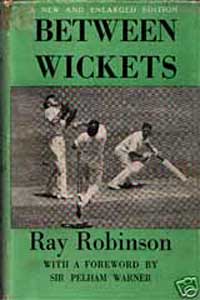Should you wish to discover - and why wouldn't you? - just what sorts of men the pre-1940 players whose names still appear in the all-time Test tables were, you would do well to dip into Ray Robinson's books. Here are flesh-and-blood insights into Herbert Sutcliffe and Stan McCabe, Don Bradman and Douglas Jardine, Percy Chapman and Bill Ponsford, and many others.
This gem among publications ran to several editions, making its gentle author a proud man. "Robbie" was liked and trusted because he genuinely loved cricket and never let it or its practitioners down. Most cricket writers of his time were welcomed into the players' space, and since they never betrayed confidences or leaked gossip they were afforded precious insights into the men who played the game - cricketers who were more worldly and interesting than later generations, for all the moderns' wealth and glamorous global exposure.
Ray himself was an unusual study in the press box. He never missed a ball or a nuance, placing his face close to his notepad and squinting away as he chronicled in neat, tiny handwriting. He was the nearest thing Australia had to a Neville Cardus.
For his sweet nature he was known to friends as "Sugar Ray". His sense of fun drove him to seek the colourful, impish expression. On the first page of Between Wickets, he says that Don Bradman's achievements "are enough to make a United States Air Force communiqué seem like an understatement". His masterly profile of Herbert Sutcliffe honours the coolest batsman ever to occupy the wicket. Twenty years before Wally Grout's memorable remark about Ken Barrington, Robinson imagines Sutcliffe draped in the Union Jack.
The book is not without blemish: the silly "We'll get 'em in singles" canard is given credence, and Jack Gregory's fastest Test century (70 minutes) is inexplicably overlooked. But the true glory is the detail - for instance only once in the 49 Ashes Tests between the two world wars was a team sent in to bat - interwoven with colourful expression: "Besides being the white race's most glorious fieldsman of the era, the giant Kent brewer [Chapman] was the only English captain in King George V's reign who made a hundred against Australia".
Not many cricket books can be defined as good for the soul, but this one can.
From the book
I think the reason why [Stan] McCabe dared so much when others had lost heart is that he had no dread of failure. Despite the glare of publicity and the tension of international encounters, the sternest Test match never ceased to be a game of cricket to him. He went in and played in the way he felt the situation required. If he failed he accepted it as just one of those things. He came up smiling again next time. His character is reflected in this and in the sunny nature of his strokes. In McCabe the cricketer you saw McCabe the man - urbane, sociable, unpretentious, straightforward, incapable of anything mean-spirited. Of the players in the Test rubbers immediately before the war, he was the best-liked by his own team and by the opponents. Even the bowlers on whom he operated so freely found his bedside manner so pleasant that they felt they had not been hurt much, no matter how he carved them about. His nickname is "Napper" - derived from Nap, because of his facial resemblance to Napoleon, even to a mid-forehead tuft denoting where the hairline used to be when he was 19. As he neared 30, the resemblance to the thickset Emperor spread elsewhere, but this chubbiness did not lessen the grace of his batting; it simply rounded it out.
Between Wickets
by Ray Robinson
Collins, 1946
